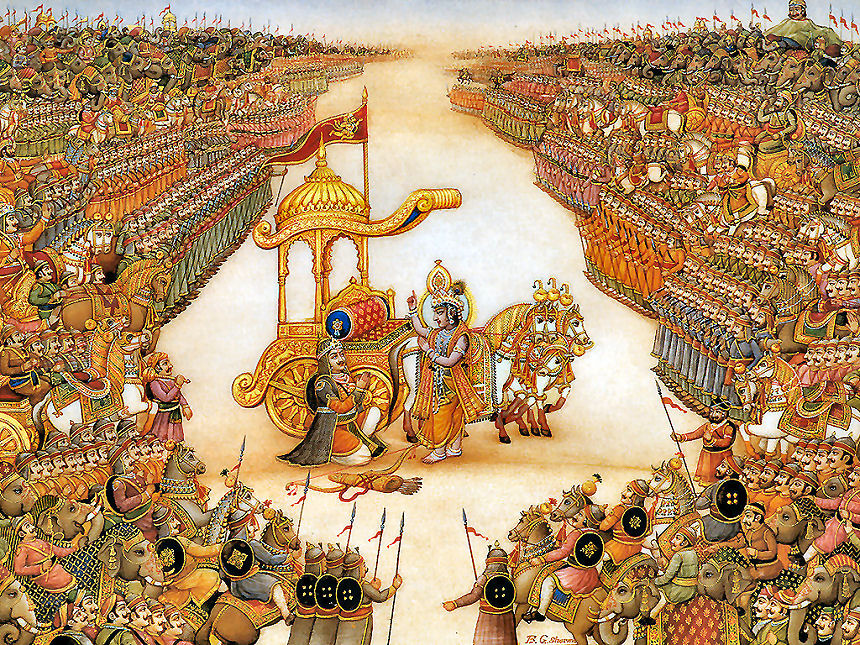|
Vedic Sanskrit Glossary - O -
oatmeal — the hulled oat grain that has
been rolled or cut into flakes. There are three basic types — quick cook,
or rolled oats, which generally has small flakes; hulled or gritted
oatmeal; and steel cut oatmeal. Oatmeal is among the most nutritious of
all the grains — it is 16.7% protein and is rich in inositol (one of the B
complex vitamins), iron, phosphorus, and thiamine. Oatmeal is generally
used as porridge or muesli, but is also baked in breads and savoury
dishes. It is available at any grocery store. Ocean of Milk — One
of the seven oceans surrounding the “islands” of Jambūdvīpa, the
earthly planetary system. Within the Ocean of Milk lies an eternal
spiritual planet, Śvetadvīpa, the abode of Kṣīrodaka-śāyī Viṣṇu. * Oḍana-ṣaṣṭhī — ceremony at the beginning of winter when Lord Jagannātha gets a winter shawl. * okra — the rigid green seed pods of he plant Hibiscus esculentus.
These elegantly curved and pointed pods are used as a vegetable in many
cuisines of the world, notably North Indian, Middle Eastern, and
Creole. Its flavour resembles eggplant but with a somewhat mucilaginous
texture. Choose crisp, fresh, green pods no longer than 10 cm (4
inches). Avoid shrivelled, limp, dull, or bruised specimens. Okra is
available at quality greengrocers and produce markets. * olive oil — the oil extracted from the fruits of the Mediterranean tree olea europaea. The
finest olive oil is cold-pressed from fresh ripe olives and has a
pale-yellow or greenish colour and a very delicate flavour. Cruder
versions of olive oil are second pressings made under heat. I prefer to
have two grades of olive oil in the kitchen — mild, cold-pressed
extra-virgin olive oil for salads and uncooked dishes, and a pure grade
olive oil with a high smoking-point for cooking. Choosing olive oil is
much a matter of personal taste and preference. Olive oil is used in
many cuisines of the world — not only in Mediterranean cooking. Good
quality olive oil is available at specialty and Continental grocers. * olives — the fruits of the semi-tropical evergreen tree olea europaea.
Used in all types of Mediterranean, Middle Eastern, European, and
Creole cuisines, olives vary in size, colour, oil content, and flavour.
Green olives are gathered unripe, whereas black olives are those which
have been allowed to ripen. Crude olives straight from the tree are
intensely bitter and quite inedible. They have to be washed to remove
the bitterness, then pickled for some months in salt water until they
resemble the olives as we know them. See also: Kalamata olives. * om tat sat — the three transcendental syllables used by brāhmaṇas for
satisfaction of the Supreme when chanting Vedic hymns or offering
sacrifice. They indicate the Supreme Absolute Truth, the Personality of
Godhead. * oṁkāra — oṁ, the root of Vedic knowledge; known as the mahā-vākya,
the supreme sound; the transcendental syllable which represents Kṛṣṇa,
and which is vibrated by transcendentalists for attainment of the
Supreme when undertaking sacrifices, charities and penances. * orange blossom water — the
fragrant water distilled from orange blossoms and used particularly in
Middle Eastern cuisine. France produces and exports high-quality
orange-blossom water, as does the Levant, particularly Beirut. It can be
used in savoury rices, sweets, and drinks. * oregano — a
piquant herb famous in Greek and Italian cuisine. Oregano is
botanically confused with marjoram. In fact for many years both marjoram
and oregano were known as Marjorana hortensis. There is still
confusion today — oregano is still sometimes known as “Wild Marjoram”.
Generally, what is purchased as oregano today is most probably Origanum vulgare,
with a strong, piquant, sweet flavour and a pleasantly bitter, aromatic
undertone. Oregano is excellent with any tomato dish, especially pizza
and varieties of tomato dishes that include pasta sauce. Its flavour
marries well with basil. Oregano is available at any continental grocer,
supermarket, or specialty shop.
|



